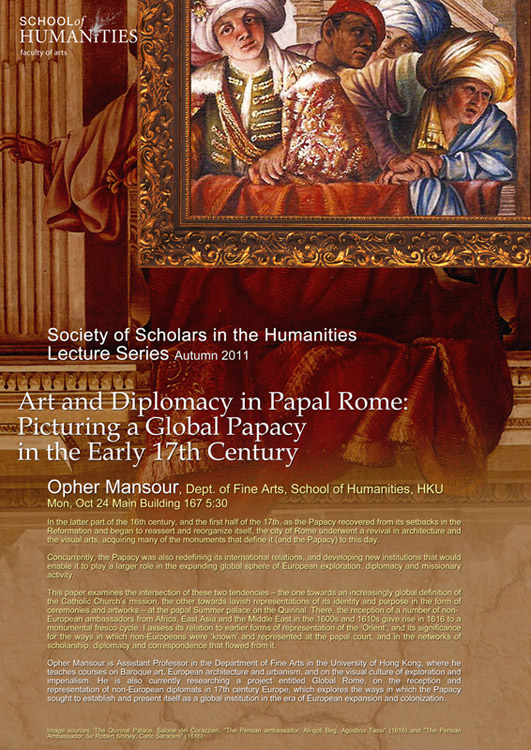

Art and Diplomacy in Papal Rome: Picturing a Global Papacy in the Early 17th Century
October 24, 2011 @ 5:30 pm - 7:00 pm
Art and Diplomacy in Papal Rome: Picturing a Global Papacy in the Early 17th Century
Date: 24 October 2011 (Monday)
Time: 5:30pm
Venue: Room 1.67, Main Building, HKU
In the latter part of the 16th century, and the first half of the 17th, as the Papacy recovery from its setbacks in the Reformation and began tot reassert and reorganize itself, the city of Rome underwent a revival in architecture and the visual arts, acquiring many of the monuments that define it (and the Papacy) to this day.
Concurrently, the Papacy was also redefining its international relations, and developing new institutions that would enable it to play a larger role in the expanding global sphere of European exploration, diplomacy and missionary activity.
This paper examines the intersection of these two tendencies – the one towards an increasingly global definition of the Catholic Church’s mission, the other towards lavish representations of its identity and purpose in the form of ceremonies and artworks – at the papal Summer palace on the Quirinal. There, the reception of a number of non-European ambassadors from Africa, East Asia and the Middle East in the 1600s and 1610s gave rise in 1616 to a monumental fresco cycle. I assess its relation to earlier forms of representation of the ‘Orient’, and its significance from the ways in which non-Europeans were ‘known’ and represented at the papal court, and in teh networks of scholarship, diplomacy and correspondence that flowed from it.
Speaker: Opher Mansour
Opher Mansour is Assistant Professor in the Department of Fine Arts in the University of Hong Kong, where he teaches courses on Baroque art, European architecture and urbanism, and on the visual culture of exploration and imperialism. He is also currently researching a project entitled Global Rome, on the reception and representation of non-European diplomats in 17th century Europe, which explores the ways in which the Papacy sought to establish and present itself as a global institution in the era of European expansion and colonization.



Find us on…